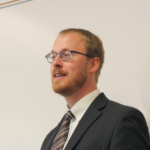Maximus the Confessor reflected deeply on Christology as well as the metaphysical question of the relation between God and His creation and shaped his thoughts in a way that takes the Triune God as He is manifested in Christ as the paradigm for all further thought. Over against the emperor’s attempt at a compartmentalization of the fields of theology for the sake of a political mediation between warring factions within the Church, Maximus was intent on offering a coherent and orthodox account of Trinitarian thought, Christology, and anthropology. This coordination of all the disciplines allowed Maximus to take both Christ’s humanity and His divinity fully seriously and not compromise either of the two natures of Christ for the sake of their union. This illuminates the claim in Gaudium et spes, 22 that only in and through the divine Son’s complete and perfect actualization of his human nature does it become clear who the human being is in truth. Rather than following a competitive model of the union of man and God in Christ, Maximus holds that in Christ’s hypostatic union, God manifests Himself as the guarantor and safeguard of true humanity and becomes as it were identical with His human nature. The question of this seminar is, then: How does Maximus help us understand the revelation of Christ’s divine nature in and through his humanity, when God fully guarantees and safeguards the human aspect precisely within this divine revelation? This seminar will have to engage with the concept of askesis as the perfection of man and study the foundational texts of Maximus to trace answers to the aforementioned question.
Selected Texts
Maximus Confessor, On Difficulties in the Church Fathers: The Ambigua, vols. 1 and 2.
Maximus Confessor, On Difficulties in Sacred Scripture: The Responses to Thalassios.
Maximus Confessor, On the Ecclesiastical Mystagogy - A Theological Vision of the Liturgy.
Maximus Confessor, Disputation with Pyrrhus.
Faculty

Jonathan Bieler
Assistant Professor of Patrology and Systematic Theology
Dr. Bieler received his doctoral degree in theology at the University of Zürich (2017), with a dissertation in Patristics on the coherence of Maximus the Confessor’s thought, which is published by Brill (2019). He taught in the theological faculty at the University of Zürich and assisted the chair of Patristics with teaching and research. In his work, he strives to combine the usage of historical-critical methods with faithfulness to the Church’s living tradition.
Learn More